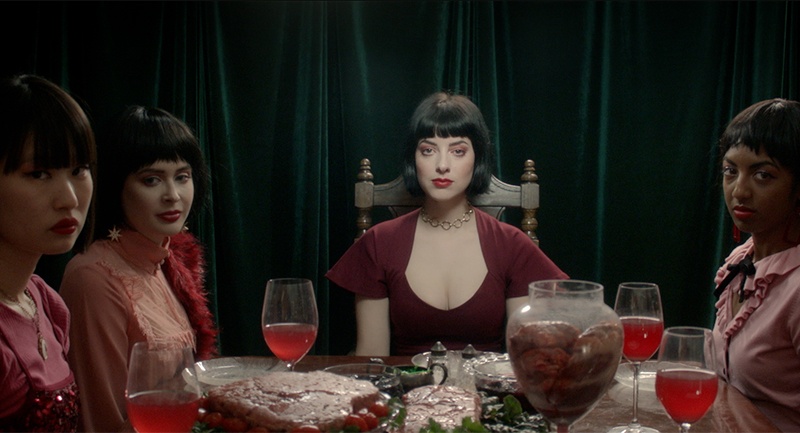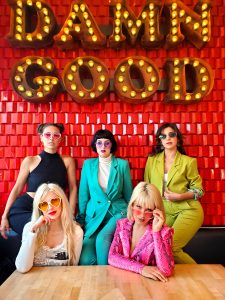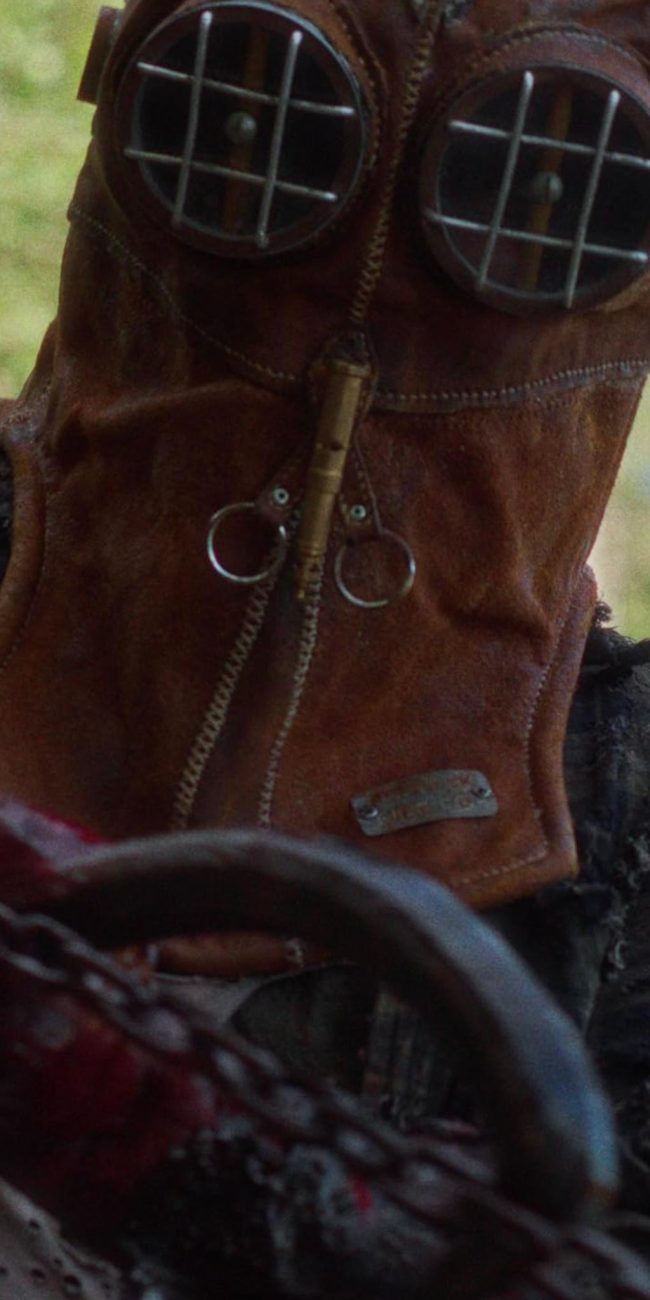A Conversation with the Fatale Collective (BLEED)

One of the great joys of being both a journalist and a filmmaker is going to fests as one and immediately turning into the other. Last year, with my film Conversion Therapist playing FilmQuest, I had the great privilege of witnessing the world premiere of Bleed, an anthology short film (didn’t even know such a thing existed) composed of six films by six female writer-directors, the self-proclaimed the Fatale Collective. Lola Blanc, Francesca Maldonado (Frenchi), Danin Jacquay, Linda Chen, Natasha Halevi (Tasha), and Megan Rosati followed that up with a screening at genre film’s crown jewel, Fantastic Fest, where I was able to sit down with 5/6ths of the team and talk, hours before hopping on a plane to Norway and missing the whole festival. (You can watch Bleed here)
Our conversation quickly swayed away from a discussion about their project and how they worked together to something far more interesting and timeless, the place of women in horror. In 2018 Jason Blum and Blumhouse made headlines in a bad way by blurting out “there are not a lot of female directors period, and even less who are inclined to do horror” during an interview, apparently forgetting about Jennifer’s Body, Raw, Revenge, American Psycho and The Babadook, amongst countless others. In 2017 I watched a male producer pull a microphone out a female director’s hands at Sundance to mansplain how the female anthology feature XX came together. The women of the Fatale Collective represent a new wave in horror. They aren’t going to wait for the men to ask them to play in their sand boxes. They are smart, sassy, and I guarantee you they know just as much about horror as you do.
On Fantastic Fest’s opening day, we met up for breakfast tacos at Torchy’s. I’ve been sort of waiting for the film to be released to release this interview, but, rereading it, you really don’t need to see the film to get excited about what their fierce females have in their future. And, in these days where we seem to be living in a horror film, it seems like a good time to for some extended reading material to distract you from your quarantine, as well as a few streaming suggestions for shut ins.
Before we get started, let me suggest you dive into this 19 second trailer filled with more style and tension than most horror films manage in 90 minutes.
“It’s a micro anthology of horror shorts, all directed by women, united by the theme of the horror of being a modern woman,” says Lola Blanc, “we sort of started combining in layers. Megan and I were friends originally and Danin and I were friends and I was looking for a community and we all knew we wanted to do something. And then when we met Frenchi, it became obvious that we needed to collaborate together.”
Part of the impetus of the project, which ended up with six founding members of the collective, was the need to create a community. Megan Rosati had been a finalist on Project Greenlight and Shudder as well as Clive Barker’s independent horror film maker contest. She sold a pilot and got management but instead of the sky being the limit, she ran into the glass ceiling. “I would go into a meeting,” Rosati remembers, “the development person would be usually a woman, my age. We would get along great. She loved my ideas. She’d pass it up and they would kibosh it.” Conversations with Lola who was similarly frustrated led to the idea of making something quickly where they were the decision makers, “creating a template for something where we could lift other women up within the genre.”
“There just need to be more stories told by the people who are actually watching them,” interjects Blanc, “something like, ‘1% more women watch horror movies than general other movies at the theater and it’s not being reflected in who’s actually directing and getting to create that content.” Rosati recounts a story about a pitch meeting in which the table full of white men could not bring themselves to say the word ‘period’ instead resorting to vague gestures ‘We really like the scene with the…(gesture) where you … (gesture) and you know… (gesture)’ “He had sex with her on her period?” she finally asked “I thought that up. I wrote it down. You don’t have to be frightened to tell me my own idea. And that’s when I was like ‘okay, we got to make some changes.’”
However, even with the goal in place of making content for women their own age, there is still a bit of difficulty in making the dream a reality. “We have to be able to shift our paradigm,” says Tasha Halevi, “because as women we have been watching horror – and really everything – created by men for so long that, sometimes when we sit down to write, we accidentally take on this male voice.” She describes her quest to discover, or rather rediscover her authentic voice, before it might be reprogrammed ‘for men.’ She even confessed that most of her initial protagonists ended up being men because it allowed her to imagine things for her protagonist that she didn’t imagine a female protagonist could do. This is what drew her to genre film, where she could essentially create rules of the world, and having her characters do anything.
So what is the “female gaze?”
“Women, when they are shot by men are treated as something visual to look at,” says Blanc, “when it’s coming from a woman’s perspective…it’s representing more of an interior life.” She sets a comparison of a female character, alone on an abandoned street, walking at night. Is she hot? Or is she a little bit afraid? Two very different ways of approaching the scene. “I think women do a lot of observing” says Halevi, “we have a history of being quiet and paying attention to what’s going on, it’s worth bringing forward to film.”
I mentioned Jason Blum’s inability to name any female horror director and the table explodes. “I just watched a new documentary about why people like horror so much and they forgot to put women in it,” Danin Jacquay points out. Are you kidding me? She can’t remember the title “I don’t remember the exact line, but they were like ‘Men like women more who cuddle up to them and are like, ‘I’m scared,’ during a horror movie.’ and I was appalled.”
Tasha: I’m tired of people looking at me like they don’t believe me when I say that I like horror. I’ve liked horror my whole life. It makes no sense that I wouldn’t be allowed just because I also like makeup.
Lola: They’re non-exclusive.
Danin: It’s true. If you’re into fashion and presenting yourself in a particular way, you are taken less seriously as a filmmaker.
Rosati puts forth a great argument for women being uniquely prepared for filmmaking: “I read some quote that was like ‘women, growing up we play with dolls, which is basically directing.’ You have your little actors who can’t move or speak and they do exactly what you tell them to do and you make up stories and that’s what it is.” Growing up consuming media only further prepares a female director. “We’re used to putting ourselves in the shoes of male protagonists because so much of our books and movies and TV stars are men,” she explains, “we’re used to putting our perspective into somebody else’s view point. And so I think that translates to film by really adding complexity to characters and a real focus on the interiority of their experience.”

From here the conversation turns back to male gaze vs. the female gaze. The unspoken fear in the boys’ club is that letting women in the door means the end of everything sexual and we’ll have a film full of women in pantsuits. (Incidentally, Lola is rocking a sunrise pantsuit and looks amazing). In the days before free online porn, the first boobs most boys of a certain age saw were in horror film. Are they out to ruin an army of masturbating boys’ fun? “It’s relevant to the story at hand, then great,” says Jacquay, “but gratuitous sex that has nothing to do with the story, that’s where it becomes a problem. ”
“It’s not just done just for the viewer like to see boobs,” suggests Halevi, “But if it was done by a female filmmaker, I would just trust her. I would be like, ‘Oh she likes this, okay.’
So why does she get to make that scene but a male filmmaker doesn’t?
“Because I’ve experienced that scene.” We all turn to Francesca (Frenchi) Maldonado. She hasn’t said anything since we started the interview. It’s true that Lola, Megan, Tasha, Danin and I slipped into an easy conversation, basically picked up from the week before at FilmQuest, but Frenchi seems to hold her words until they can land with the most power. Maldonado explains: “if I want to show some girls in a college sorority getting naked in the bathroom, getting ready, I’m entitled to do that because we haven’t had the opportunity to do that yet. And I, too, I was a girl in a college sorority getting naked and getting ready. So, I might have something a little more interesting to tell you about that.”
“That’s a real experience from me. And…Spoiler alert, we were hot…” Frenchi has to hold for laughter and at least one high-five. She continues, “We’re allowed to be sexual and gratuitous and show the female body and show hot things, but I can guarantee the way we tell that story is going to be more interesting because they are coming from places of experience.”
In Rosati’s film in Bleed, ASMR, she names her character ‘Sexy Baby’ and fills the screen with closeup of lips and skin. “There’s something new that the people who haven’t traditionally embodied the object of that gaze can offer,” she says, “Hey I’m still here and I’m looking at you.” Blanc says her film and Bleed stands in start opposition of any presupposition that women are fragile. “If we like to be scared and we think it’s fun and we don’t need some man to comfort us,” she says, “that’s threatening.”
Frenchi shrugs: “they feel like something’s being taken away from them and that’s their ego and they got to deal with that. That’s their own issue ’cause this is filmmaking. There’s no ownership of it. You create something out of nothing every single time. So, no one else contains that.”
Danin brings up the just published Dead Blondes and Bad Mothers: Monstrosity, Patriarchy, and the Fear of Female Power by Sady Doyle. “By keeping us in these roles of sexy objects or just the girl who gets killed and being like, ‘Oh, you’re too scared for horror,’” she explains, “it’s a way for the patriarchy to maintain control over us because if we were able to fully realize our power, that frightens people.”
Lola: God forbid we should be allowed to scare men.
Halevi believes that horror is just the proverbial canary in the coal mine. With the film industry finally acknowledging its deeply rooted missteps towards women in a way that is very public (since this interview Harvey Weinstein has gone to trial and been sentenced to 23 years), this is a place where they can make a difference first. “Changes in story, the changes in more females in power as producers, as directors, as executives,” she says, “it is the indicator of a change across society. I’ve worked in other industries — architecture in particular — that is far more male dominated and women are treated far worse than in the film industry. People don’t talk about it because architecture as an industry isn’t really glamorous or interesting or dramatic or high profile or full of celebrities.”
For the women of the Fatale Collective, men have lost almost as much as women under the current system. They find themselves into roles where they have to be heroes or strong, or unable to cry and show emotions. Women filmmakers may be more willing to acknowledge the potential of what’s possible simply because they’ve been so pigeonholed. “The way we come to a solution is to allow everyone to explore different aspects of their own personalities and our own humanity,” says Halevi, “so that we can all be better together.”
“There is this perception that feminists want to take over and marginalize men as reaction to us being marginalized, and I think that’s largely not true,” agrees Blanc, “all we want is an equal playing field to be able to tell the whole breadth of stories that are out there and to tell in the most interesting way possible.”
Danin Jacquay starts packing up her garbage. They have a festival to take over and I have a plane to catch. “I just think of this quote, ‘When you used to be privileged, equality feels like oppression,’” she says, “You just had the whole booth at the restaurant to yourself, dude, we just want to sit at the other end.”
– Bears Rebecca Fonte (@BearsFonte)











